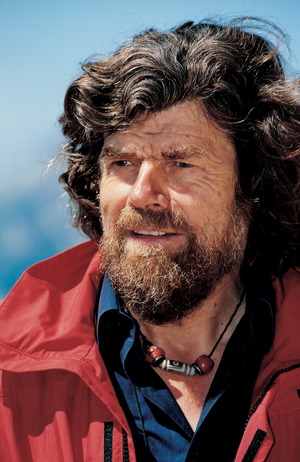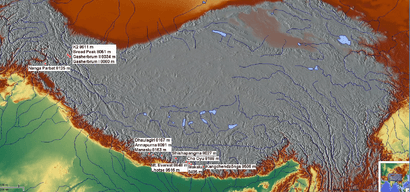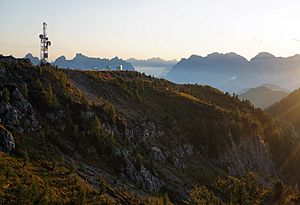Reinhold Messner facts for kids
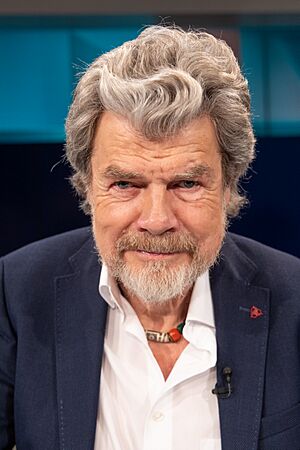
Messner in 2024
|
|
| Personal information | |
|---|---|
| Nationality | Italian |
| Born | 17 September 1944 Brixen (Bressanone), South Tyrol, Italy |
| Climbing career | |
| Known for | First to climb all 14 eight-thousanders, first to climb all 14 eight-thousanders without supplemental oxygen, and first to climb Mount Everest without supplementary oxygen |
| First ascents |
|
| Major ascents | First solo ascent of Mount Everest and first ascent without supplemental oxygen |
Reinhold Messner, born on September 17, 1944, is a famous Italian climber, explorer, and writer. He comes from a German-speaking area in Italy called South Tyrol.
He is known for many amazing achievements in mountaineering. He was the first person to climb all 14 of the world's highest mountains, known as eight-thousanders, without using extra oxygen. He also made the first solo climb of Mount Everest.
Messner was also the first to cross Antarctica and Greenland without using snowmobiles or dog sleds. He even crossed the Gobi Desert by himself. Many people consider him one of the greatest mountaineers ever.
From 1999 to 2004, Messner was a member of the European Parliament. He has written over 80 books about his adventures. He has also received important awards for his climbing achievements.
Contents
Early Life and Climbing Start
Reinhold Messner grew up in a German-speaking family in a small town in South Tyrol, Italy. He was the second of nine children. His family lived simply.
From a young age, Messner loved climbing in the Alps, especially the beautiful Dolomites. His father, who was a school director, took Reinhold on his first climb when he was just five years old.
When Reinhold was 13, he started climbing with his younger brother, Günther. By their early twenties, both brothers were among the best climbers in Europe.
In the 1960s, Messner became a strong supporter of "alpine style" climbing. This means climbing mountains with very light gear and little outside help. He believed this way was more respectful to nature than large "expedition style" climbs.
Messner's Climbing Career
Before his first big climb in the Himalayas in 1970, Messner was already famous for his climbs in the Alps. Between 1960 and 1964, he completed over 500 climbs, mostly in the Dolomites.
He achieved many "firsts" in the Alps. For example, in 1967, he made the first winter climbs of the Agnér north face and the Furchetta north face. In 1968, he made the first ascent of the Heiligkreuzkofel middle pillar.
In 1969, Messner went on an expedition to the Andes mountains. There, with Peter Habeler, he made the first climb of the Yerupaja east face. These achievements made him known as one of Europe's top climbers.
Nanga Parbat and a Tragic Climb
In 1970, Messner joined a large expedition to climb the unclimbed Rupal Face of Nanga Parbat in the Himalayas. His brother Günther was also on this trip. This expedition changed Messner's life forever.
Reinhold and Günther reached the summit, but Günther sadly died two days later during the descent. Reinhold suffered severe frostbite and lost seven toes. This event led to many discussions and a movie called Nanga Parbat (2010).
After this, Messner focused more on climbing higher, icy mountains, as his feet were not as good for rock climbing.
Climbing Without Oxygen
In the 1970s, Messner strongly believed that Mount Everest should be climbed without extra oxygen. He wanted to do it "by fair means."
In 1978, he and Peter Habeler reached the summit of Everest without using oxygen. This was a huge achievement, as many experts thought it was impossible.
Two years later, in 1980, Messner climbed Everest again, this time completely alone and still without oxygen. He did this during the monsoon season, which made it even harder. This was the first solo climb of Everest.
The Fourteen Eight-Thousanders
In 1986, Reinhold Messner became the first person in the world to climb all fourteen eight-thousanders. These are the 14 mountains that are over 8,000 meters (about 26,247 feet) high. He achieved this amazing feat without using any supplementary oxygen.
His climbs included:
- 1970: Nanga Parbat (first climb of the Rupal Face)
- 1972: Manaslu (first climb of the South-West Face without oxygen)
- 1975: Gasherbrum I (first without oxygen, with Peter Habeler)
- 1978: Mount Everest (first without oxygen, with Peter Habeler), Nanga Parbat (first solo climb of an eight-thousander)
- 1979: K2 (partially in alpine style)
- 1980: Mount Everest (first solo climb without oxygen)
- 1981: Shishapangma
- 1982: Kangchenjunga, Gasherbrum II, Broad Peak (first person to climb three 8000ers in one season)
- 1983: Cho Oyu
- 1984: Gasherbrum I and Gasherbrum II (first traverse of two eight-thousanders without returning to base camp)
- 1985: Annapurna (new route on the North-West Face), Dhaulagiri
- 1986: Makalu, Lhotse (completing all 14 eight-thousanders)
Other Major Expeditions
Messner's adventures weren't limited to the highest peaks. He also:
- Crossed Antarctica on skis with explorer Arved Fuchs (1989–1990).
- Crossed Greenland on foot (1993).
- Completed a 2,000 km (1,240 mi) expedition through the Gobi Desert (2004).
He also became the second person to complete the "Seven Summits" challenge, which means climbing the highest mountain on each of the seven continents. He did this without using oxygen on Mount Everest.
Messner Mountain Museum
In 2003, Messner began creating a unique museum project. The Messner Mountain Museum (MMM) opened in 2006. It tells stories about mountains, their cultures, and the history of mountaineering.
The MMM has six different locations, each focusing on a different aspect of mountains:
- MMM Firmian at Sigmundskron Castle focuses on how humans relate to mountains.
- MMM Juval at Juval Castle explores the "magic of the mountains" and their spiritual meaning.
- MMM Dolomites (Museum in the Clouds) at Monte Rite is about the geology and formation of the Dolomites.
- MMM Ortles at Sulden is an underground museum dedicated to ice climbing and glaciers.
- MMM Ripa at Brunico Castle highlights the cultures of mountain peoples around the world.
- MMM Corones on top of the Kronplatz mountain focuses on traditional climbing.
Political Career
|
Reinhold Messner
|
|
|---|---|
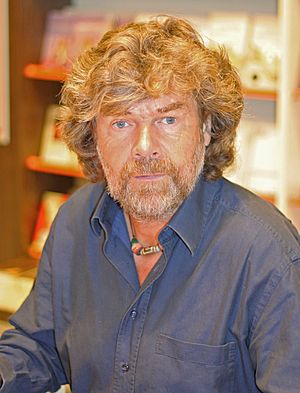 |
|
| Member of the European Parliament for North-East Italy |
|
| In office 20 July 1999 – 19 July 2004 |
|
| Personal details | |
| Born | 17 September 1944 Brixen, Italy |
| Political party | Greens of South Tyrol |
| Other political affiliations |
Federation of the Greens |
In 1999, Reinhold Messner was elected as a Member of the European Parliament. He represented north-east Italy for the Federation of the Greens, which is an Italian green political party.
He served his full term until 2004, after which he decided to leave politics. He was part of the South Tyrolean Greens, a local green party in his home region.
Personal Life
Reinhold Messner has been married three times. He has children from his relationships. In May 2021, he married Diane Schumacher.
See also
 In Spanish: Reinhold Messner para niños
In Spanish: Reinhold Messner para niños
- List of climbers
Interviews
- Gaia Symphony Documentary series (Japanese production).
- Reinhold Messner Biography and Interview on American Academy of Achievement.
| Awards | ||
|---|---|---|
| Preceded by New Zealand national rugby union team |
Princess of Asturias Award for Sports (with Krzysztof Wielicki) 2018 |
Succeeded by Lindsey Vonn |
| Preceded by n/a |
Golden Plate Award of the American Academy of Achievement 1987 {{{years}}} |
Succeeded by n/a |
 | Jewel Prestage |
 | Ella Baker |
 | Fannie Lou Hamer |


